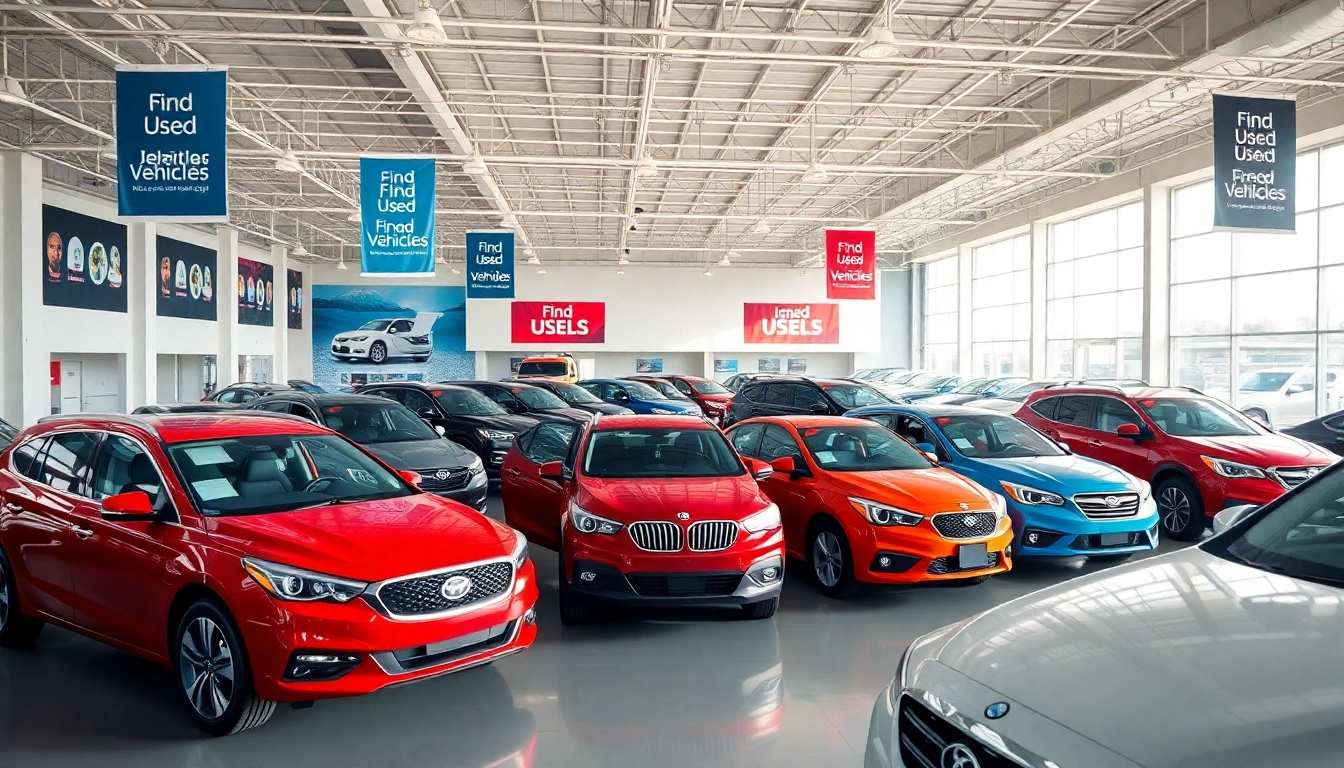Understanding the Used Vehicle Market
The used vehicle market has transformed significantly over the years, influenced by technological advancements and shifts in consumer behavior. For those looking to find used vehicles, understanding the current trends and dynamics in this market is crucial. This helps buyers make informed decisions and discover great deals while avoiding potential pitfalls.
Current Trends in Used Vehicles
Recent data indicates a surge in demand for used vehicles, driven primarily by economic factors and changing consumer preferences. More buyers are now seeking cost-effective alternatives to new cars, particularly in the wake of rising vehicle prices and interest rates. Notably, the impact of the COVID-19 pandemic has accelerated these trends. With many consumers delaying new car purchases, the used vehicle supply has experienced fluctuations, leading to elevated prices and shorter inventory cycles.
Moreover, the popularity of online platforms for buying and selling used cars has grown significantly. Websites like Autotrader, CarGurus, and Cars.com have become essentials for both consumers and dealerships, providing extensive listings and comparison tools that simplify the process.
Why Buying Used Makes Financial Sense
Buying a used vehicle can be much more financially prudent compared to purchasing new cars. The primary reason lies in depreciation. A new car loses around 20% of its value within the first year alone, while used cars tend to depreciate at a slower rate. This means that by choosing a used vehicle, a buyer can often receive a much larger value for their money.
Additionally, used cars often come with lower insurance premiums and registration fees, further contributing to long-term savings. These financial incentives are particularly attractive to budget-conscious consumers and those looking to maximize their investment.
Comparing New vs. Used: What to Consider
When contemplating a purchase, consumers should conduct a thorough comparison between new and used vehicles. Factors to evaluate include:
- Price: Used cars typically offer considerable savings in both purchase price and depreciative value.
- Financing Options: While financing options for new cars can be appealing due to lower interest rates, used cars often present the best total cost of ownership.
- Warranty Coverage: New cars come with comprehensive warranties that protect buyers against defects, but many certified pre-owned vehicles also provide warranties, making them a smart choice.
- Advancements in Technology: Consumers should consider whether the features in a new vehicle outweigh the benefits of a used vehicle that may still meet their needs.
How to Find Used Vehicles Online
Finding the right used vehicle online can initially seem daunting. However, leveraging the vast resources available today streamlines this process significantly. To help potential buyers navigate, this section outlines effective strategies for discovering used cars and optimizing search results.
Best Websites for Searching Used Cars
While local dealerships remain a valuable resource, the best websites for finding used cars have become indispensable tools. Some of the top online platforms include:
- Autotrader: Known for its extensive listings and robust search filters, Autotrader allows users to pinpoint their desired features efficiently.
- Cars.com: This site not only offers vehicle listings but also includes user reviews and comparative pricing tools.
- CarGurus: CarGurus specializes in transparency by assessing market values and highlighting good deals on various vehicles.
- Carfax: With every certified used vehicle listing, Carfax provides free vehicle history reports, ensuring peace of mind for buyers.
Tips for Narrowing Down Your Search
To refine your search for the ideal used vehicle, consider the following steps:
- Define Your Budget: Establish a clear budget that includes not only the purchase price but also expected costs such as insurance and maintenance.
- Set Preferences: Determine which vehicle types, makes, and models meet your needs based on lifestyle, family size, and driving habits.
- Limit Geographical Area: While broad searches can yield many results, focusing on a specific region can simplify inspections and test drives.
Using Filters to Find the Perfect Vehicle
Filters are a powerful tool in online car searches. By applying filters such as mileage, price range, make, model, year, and special features, customers can streamline their results. Most car search websites provide these filtering options, which make it easier to discover vehicles that match your budget and preferences accurately. Fine-tuning these parameters is essential for saving time and ensuring you are focused only on the vehicles that suit your needs.
Evaluating Used Vehicles Before Purchase
A thorough evaluation of a used vehicle is imperative to make a savvy purchase. Buyers should approach this process methodically to avoid potential pitfalls. Here’s what you should know.
Essential Checks to Perform
Before purchasing a used car, it is essential to perform several checks to ensure the vehicle is safe and well-maintained:
- Visual Inspection: Look for signs of rust, dents, paint mismatches, and check the condition of the tires.
- Mechanical Inspection: Always consider an independent mechanic’s assessment to identify potential mechanical issues.
- Test Drive: It’s crucial to take a vehicle for a test drive to assess its performance, handling, and comfort level.
Reading Vehicle History Reports
Utilizing services like Carfax or AutoCheck to obtain vehicle history reports can be invaluable. These reports typically include:
- Accident history
- Service records
- Title information (such as salvage or flood titles)
Understanding a vehicle’s history helps potential buyers avoid cars with costly hidden issues.
Understanding Used Car Warranties
Many used cars come with warranties, whether through the manufacturer or dealer. Familiarize yourself with the various types:
- Dealer Warranty: Often covers certain repairs and replacements for specific durations and may cover additional wear and tear.
- Certified Pre-Owned Warranty: Typically more robust; these warranties are provided for vehicles that meet specific criteria and have passed thorough inspections.
- Extended Warranties: Buyers may consider purchasing additional coverage that extends protection beyond the standard warranty period.
Financing and Budgeting for Used Cars
Understanding financial aspects is a fundamental step in ensuring your used car purchase fits within your financial plan. Here’s how to navigate this process effectively.
Setting a Realistic Budget for Your Purchase
Budgeting isn’t merely about the price tag of the car; it includes several other factors:
- Sales Tax: Don’t forget to account for local taxes that may be applied to your purchase.
- Registration and Title Fees: These additional costs vary by state and can add thousands to the overall cost.
- Insurance Costs: Evaluating anticipated insurance premiums should also play a crucial part in your budgeting process.
Use these parameters to create a comprehensive and realistic budget prior to starting your search.
Exploring Financing Options for Used Vehicles
Determining how to finance your used vehicle can be a daunting task. Here are several pathways:
- Bank Loans: Securing a loan from a bank or traditional lender can often yield the best interest rates.
- Credit Unions: These institutions frequently offer favorable terms for members.
- Dealer Financing: Some dealerships provide financing options, but be sure to scrutinize the terms carefully to avoid higher overall costs.
Negotiating the Best Price
Negotiating is a critical component when purchasing a used vehicle. To maximize your position:
- Do Your Research: Use available online resources to determine the fair market value of the specific car model you’re interested in.
- Be Prepared to Walk Away: If negotiations fall short of your budget, have the resolve to walk away. This often empowers you in negotiations.
- Timing: Consider shopping at the end of the month or year when dealerships are eager to meet sales quotas, potentially resulting in better deals.
After Purchase: Maintaining Your Used Vehicle
Owning a used vehicle doesn’t end with the purchase; ongoing maintenance is vital for longevity and performance. Here are tips for maintaining your new investment.
Regular Maintenance Tips for Longevity
To extend the life of your used vehicle, establish a consistent maintenance routine:
- Regular Oil Changes: Adhere to the manufacturer’s schedule to maintain engine health.
- Tire Maintenance: Regularly check tire pressure and rotate tires as recommended to ensure safety and optimize fuel efficiency.
- Brake Inspection: Monitor brake performance and replace pads and rotors as required.
Handling Common Used Car Issues
Awareness of common used car issues can prepare you for potential challenges:
- Electrical Problems: Inspect electrical systems periodically, as they can be difficult to troubleshoot if they fail.
- Transmission Troubles: Regular checks of transmission fluid and operations can prevent more severe issues.
- Suspension Issues: Watch for any unusual sounds or behaviors while driving, as these can indicate wear and tear in suspension components.
Resources for Parts and Service
Identifying reliable resources for parts and servicing is pivotal:
- Certified Mechanics: Seek mechanics who specialize in your vehicle make and model for reliable service.
- OEM Parts Suppliers: Use original equipment manufacturer parts, if available, to ensure quality and compatibility with your vehicle.
- Online Parts Stores: Websites such as RockAuto or AutoZone can offer a wide selection of parts at competitive prices.



